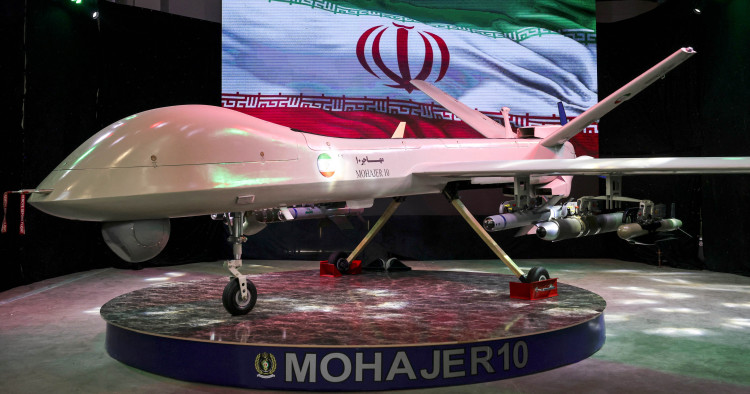Contents:
- The US response to Sunday’s attack on American forces: Reactive or strategic?
- US deliberations on withdrawing from Syria and Iraq could not have come at a worse time
- Prospects modestly improve for cease-fire and hostage release negotiations in Israel-Hamas war
- Aid suspension to UNRWA by US and other donors will compound already catastrophic conditions in Gaza
- The ICJ ruling in South Africa v. Israel left both sides somewhat pleased
- Regional fallout from the Gaza conflict continues — and hits Egypt on two fronts
- Pakistan’s elections enter the home stretch
- F-16 sale removes a major hurdle in US-Turkey ties but mistrust lingers
The US response to Sunday’s attack on American forces: Reactive or strategic?
Paul Salem
President and CEO

-
The Jan. 28 drone attack on a US logistics base in northeastern Jordan dramatically ups the ante for the Biden administration in the widening Middle East crisis, forcing it to react; but the United States should consider its next moves from a strategic perspective.
-
It is in the US’s and the region’s interest to double down on diplomatic efforts to end the war in Gaza, thus preventing Iran and its allies from seizing control of Washington’s regional strategy and tactics.
The Jan. 28 drone attack on a US logistics base in northeastern Jordan that killed three American service members and wounded at least 34 dramatically ups the ante for the Biden administration in the widening Middle East crisis. The United States should consider its next moves from a strategic perspective, and not purely a reactive one.
The US’s and the region’s security and stability interests are best served by doubling down on the diplomacy that has reportedly brought Israel and Hamas very close to a prisoner exchange and a two-month cease-fire. Such a diplomatic and de-escalatory breakthrough could lay the groundwork for a more permanent cease-fire and an ending of the war in Gaza as well as advance efforts to provide large-scale humanitarian and emergency aid to the people of Gaza. In the medium term, it might enable progress on negotiating a Palestinian Authority-led postwar governance situation in Gaza and a pathway to reviving Israeli-Palestinian-Arab talks toward a two-state solution and a wider peace.
The Hamas attacks of Oct. 7 were partly timed to derail regional de-escalation and normalization trends — especially as the latter were completely ignoring Palestinian rights and needs. Yesterday’s attacks on the US base in Jordan should not be allowed to similarly overturn the diplomatic progress currently being made. As the US counseled Israel after Oct. 7, based on the lessons America learned from its reactive response to Sept. 11, one should not allow an adversary to seize control of one’s own strategy and tactics. The US will definitely respond to this latest Iranian-backed attack — as it should. But Washington should choose the extent and timing of that response according to its own strategic priorities, not out of the news-cycle urgency of a social media-driven political need for a knee jerk reaction.
Diplomatic progress toward prisoner exchanges and ending the Israel-Hamas war will be a strategic win for the US and its friends in the region, and it will be a blow to Iran and its allies, which have been making great headway as long as the conflict continues. While considering its response to Sunday’s deadly attack on American personnel, the US should keep its strategic gameplan and interests in mind, and orchestrate its actions to advance those more valuable goals.
Follow: @paul_salem
US deliberations on withdrawing from Syria and Iraq could not have come at a worse time
Charles Lister
Senior Fellow, Director of Syria and Countering Terrorism & Extremism programs

-
One option under discussion is to facilitate a deal between the US’s local partners, the Syrian Democratic Forces, and the Bashar al-Assad regime to fight the ISIS insurgency; but this idea was impractical when it was first raised, in 2016, and it would be downright dangerous today.
-
More broadly, there can be no ignoring the context within which these new US policy deliberations are taking place, with hundreds of attacks since Oct. 7, involving half a dozen regional countries as well as American forces on the ground.
With reviews of its Syria policy and regional force posture both underway, a consensus has emerged within the United States government that a military withdrawal from northeastern Syria is now inevitable. While no decision has been made to depart, there is a newfound determination to develop a strategy that tackles existing missions like countering ISIS while paving a path that allows for an eventual departure to be safe, orderly, and that would leave behind conditions that serve the interests of American and international security. With bilateral talks between the US and Iraq regarding the future shape of America’s footprint on Iraqi soil about to begin, deliberations continue as to what steps are needed next door, in Syria.
One option under discussion has been to facilitate a deal between the US’s local partners, the Syrian Democratic Forces (SDF), and the Syrian regime of Bashar al-Assad, allowing for a joint effort to contain, degrade, and defeat a persistent ISIS insurgency. This idea has lingered within some circles of the US government for years — having been a consistent private talking point of Brett McGurk, currently President Joe Biden’s Middle East coordinator, since at least 2016. It was impractical back then and downright dangerous today.
Notwithstanding the abhorrent idea of lending credibility to Assad’s regime, the SDF’s Kurdish constituency would feel justifiably abandoned, and the SDF’s Arab components (most of whom originated in Syria’s anti-Assad armed opposition) would find themselves in front of a virtual firing squad. Worse still, the Syrian regime, whose 12 years of crimes have fueled ISIS more than any other factor, has proven wholly incapable of even containing ISIS in the areas nominally under government “control.” In 2023 alone, the militant group conducted at least 212 attacks, killing more than 500 people in the regime-held central desert. With ISIS’s reach continuing to expand across regime territories, its attacks are growing more audacious and sophisticated. The group now holds territory again, where it is widely recognized as a shadow authority. For ISIS, a US withdrawal and an SDF-Assad “deal” could not be a more enticing prospect.
More broadly, there can be no ignoring the context within which these new US policy deliberations are taking place. The deadly attack on U.S. forces at Tower 22 in northeastern Jordan, just across the Syrian border, has brought the U.S. deployment in Syria right back into policy focus. With war continuing to rage in Gaza, there have so far been more than 450 Hezbollah attacks targeting Israel; more than 180 Iranian proxy attacks on US forces in Iraq and Syria; at least 32 Houthi missile attacks targeting commercial shipping in the Red Sea; and other long-range missile attacks targeting Israel, Iraq, Syria, and Pakistan from Iran, Yemen, and Iraq. In such a combustible and strategically dynamic time, the last thing the US should be doing right now is considering downgrading or withdrawing its forces from these sensitive and vital theaters.
Follow: @Charles_Lister
Prospects modestly improve for cease-fire and hostage release negotiations in Israel-Hamas war
Brian Katulis
Vice President of Policy

-
Hopes for a diplomatic breakthrough on the war in Gaza have increased slightly in recent days.
-
Even if some deal is reached, the longer-term prospects for a lasting diplomatic resolution to the war remain slim because of the irreconcilable differences between Israel and Hamas.
Biden administration officials have sounded a slightly more optimistic note in recent days about the prospects for another cease-fire and impending release of hostages held in Gaza.
President Joe Biden sent Central Intelligence Agency (CIA) director William Burns to Paris this past weekend for discussions with Israeli, Egyptian, and Qatari counterparts about a possible framework for a deal that could lead to a two-month suspension of the Gaza war in exchange for the release of the more than 100 hostages still held by Hamas. The goal for this particular deal is to last longer and involve more issues than the one that produced a week-long cease-fire from Nov. 24 to Dec. 1 and led to the release of over 100 hostages in exchange for more than 200 Palestinian prisoners. The hope is that a lengthier period of calm and stability could create the space for more diplomacy and set the conditions for a more enduring understanding.
But even as diplomats ramped up efforts for a new deal, the parties to the conflict took physical steps to influence the scope and direction of those discussions. It is important to keep in mind that negotiations like these don’t solely happen in conference rooms in Paris or in ongoing text exchanges over WhatsApp; the negotiations are also, in a sense, taking place on the battlefield and in the media.
Case in point, just as word emerged of renewed diplomatic momentum and increased hopes for a deal, Hamas released a propaganda video of three young Israeli women held hostage in Gaza since the Oct. 7 attack. This move was not just the latest salvo in Hamas’ psychological warfare against Israel; it was also an effort to shape the nature of the discussions over a possible hostage release and cease-fire. In essence, this move was designed to put pressure on Israel’s negotiators to accept terms put forward by Hamas by targeting the Israeli public with propaganda aimed at swaying strong emotions about the hostages.
Israel also continues to undertake actions in the real world, outside of the diplomatic talks, designed to impact on those negotiations — including by continuing its military campaign in parts of Gaza. Israel has stated that its goal is to remove Hamas as a threat to Israel’s security and destroy its capacity to govern in Gaza, even as the desired end-state for this Palestinian territory remains unclear. Israel has also vowed to eliminate key leaders of Hamas; and at the start of this year, an Israeli strike killed Salah Arouri, a Hamas official based in Beirut who had been involved in previous rounds of cease-fire and hostage release discussions, according to news reports. This strike, occurring while efforts to negotiate a ceasefire and hostage release were ongoing, suggests the Israeli government lacks a coherent plan to achieve two key goals it set for itself in the Gaza war: securing the safe release of all its hostages while at the same time eliminating top Hamas leaders. The fact that Israel seeks to eliminate the leadership of Hamas while it negotiates with it through Qatar and Egypt illustrates the complexities of this current moment.
Another cease-fire deal that results in even a temporary end to the violence and the release of hostages would be a good thing, but it seems unlikely at this stage to create a new avenue toward a more lasting resolution, in part because of the fundamental incompatibility of the stated goals of the main combatants. Still, if another diplomatic respite is achieved in the form of a cease-fire, the United States and its partners in the region should use the opportunity to double down on their diplomatic engagement and seek to create different conditions that not only help protect Israeli and Palestinians civilians alike but also work to marginalize those forces who oppose peaceful co-existence.
Follow: @Katulis
Aid suspension to UNRWA by US and other donors will compound already catastrophic conditions in Gaza
Khaled Elgindy
Senior Fellow, Director of Program on Palestine and Palestinian-Israeli Affairs

-
The decision by the US and other Western donors to suspend funding to UNRWA, the largest and most important humanitarian actor in Gaza, threatens to shut down the agency’s operations across the region, portending devastating consequences.
-
Israeli officials and political figures have long sought to undermine UNRWA; and rights groups have accused Israel, which controls and heavily restricts the flow of food, water, and medicine to Gaza, of using starvation as a weapon of war.
Last Friday, Jan. 26, Israel sparked an international crisis when it announced that 12 staff members (out of a total of 13,000 in Gaza) of the United Nations Relief and Works Agency for Palestine Refugees (UNRWA) were involved in the Oct. 7 attacks on the country. UNRWA has been a lifeline for Gaza’s 2.3 million people since the start of Israel’s mass bombing campaign and “total siege” of the strip. The timing of the announcement was conspicuous, coming just hours after the historic ruling by the International Court of Justice (ICJ), which found a “plausible” case for genocide in Gaza, for which Israel must answer, and specified provisional measures needed to avoid “irreparable prejudice” to Palestinian rights under the Genocide Convention. The allegations reportedly stem in part from intelligence gathered in Israeli interrogations, which, according to rights groups, have been known to involve the use of torture and other coercive methods. Israeli government and political figures have long sought to undermine or eliminate UNRWA, accusing the agency of “perpetuating” the Palestinian refugee issue. For its part, UNRWA immediately announced the termination of the 12 employees and pledged to launch a full, independent investigation into the matter.
Nevertheless, the Biden administration responded to the accusations by promptly suspending all funding to UNRWA. Several additional donors have since followed suit, including Australia, Canada, the European Union, Finland, Germany, Italy, Japan, the Netherlands, Switzerland, and the United Kingdom. The decision by the US and other Western donors to suspend funding to UNRWA, the largest and most important humanitarian actor in Gaza, threatens to shut down the agency’s operations across the region, which would have devastating consequences for the already catastrophic conditions in the war-torn territory. Gaza’s 2.3 million inhabitants already face mass starvation and the imminent threat of famine. Rights groups have accused Israel, which controls and heavily restricts the flow of food, water, and medicine to Gaza, of using starvation as a weapon of war.
UNRWA Commissioner-General Philippe Lazzarini warned that the agency’s “lifesaving assistance is about to end following countries [sic] decisions to cut their funding,” which he described as a form of “collective punishment.” A handful of Western donors, however, have refused to follow Washington’s lead. Oslo, in particular, has taken a more measured approach: “While I share the concern over the very serious allegations against some UNRWA staff,” said Norwegian Foreign Minister Espen Barth Eide, “I urge other donors to reflect on the wider consequences of cutting funding to UNRWA in this time of extreme humanitarian distress. We should not collectively punish millions of people.”
Follow: @elgindy_
The ICJ ruling in South Africa v. Israel left both sides somewhat pleased
Eyal Lurie-Pardes
Visiting Fellow

-
The International Court of Justice issued provisional measures against Israel in the case filed by South Africa, claiming Israel violated the Genocide Convention in Gaza.
-
The ruling engendered relatively welcoming responses from all sides: South Africa and Palestinians were supportive of the court's assertion that there is a plausible case for genocide in Gaza, and Israel was relieved that the ICJ did not order an immediate cease-fire.
Last Friday, Jan. 26, the International Court of Justice (ICJ) issued a ruling on the provisional measures South Africa requested in its complaint against Israel, accusing the latter of violating the Genocide Convention. The Genocide Convention defines the crime of genocide as committing certain acts with “intent to destroy, in whole or in part, a national, ethnical, racial or religious group, as such.” In the two-day oral hearing in The Hague, on Jan. 11-12, both sides presented their case — with Israel making a rare appearance in international courts after denying the ICJ’s jurisdiction in previous cases. Because the final ruling is not expected for another few years, the oral arguments focused on the South African request for several provisional measures, including an order for an immediate cease-fire.
In the provisional measures stage, the ICJ only needs to determine whether “the rights asserted by the party requesting such measures are at least plausible.” In an overwhelming majority — with at least 15 out of 17 judges deciding in favor for each point — the court ruled that South Africa met this burden and issued several provisional measures ordering Israel to “take all measures within its power” to prevent acts prohibited by the Genocide Convention. Such acts include halting the killing of civilians, allowing for enhanced humanitarian aid to Gazans, addressing incitement for the commission of genocide by public figures, and guaranteeing the preservation of evidence. The court asked Israel to submit a report regarding the implementation of the measures in 30 days.
Both sides welcomed the outcome to some extent. Pro-Palestinian commentators described the ruling in historic terms as a legal and moral victory that strips Israel of its impunity under international law. Although the court did not issue an order for an immediate cease-fire, it did recognize the plausibility of their claim, and the provisional orders provide a legal avenue to monitor Israel’s actions in Gaza and fuel the international campaign for a cease-fire. Most importantly, the court requirement for Israel to provide a report means the ICJ reserves itself the right to intervene in Israel’s actions in Gaza, which by itself could restrain the Israeli military offensive.
Israel had a more mixed response to the ruling. On one hand, Prime Minister Benjamin Netanyahu and other leading ministers bashed the ICJ, claiming it was disgraceful that the court did not dismiss the case altogether. On the other hand, government officials and pundits viewed the lack of a provisional measure ordering a cease-fire as a major success for the Israeli legal team. Top officials questioned how most of the provisional measures issued by the court would impact the Israeli war effort because, according to them, Israel has already been following international law. However, Israel will need to demonstrate in the update report to the ICJ what actions it took to comply with the ruling in a way that is different from how it operated so far.
Regional fallout from the Gaza conflict continues — and hits Egypt on two fronts
Mirette F. Mabrouk
Senior Fellow and Founding Director of the Egypt program

-
From the very start, there was fear in Cairo and other regional capitals that the Gaza conflict would not be contained to Israel's or Palestine’s borders.
-
Even as Egypt braces for a potential refugee wave from Gaza, the Red Sea attacks by the Yemeni Houthis have been disastrous for Egypt’s Suez Canal revenues, down 40% in the first half of January compared to the same period last year.
The fallout from the deadly and destructive war in Gaza continues to metastasize.
From the very start, regional countries, including Egypt, were desperately worried that the conflict would not be contained to Israel’s or Palestine’s borders. They were right. The United States — Israel’s most fervent supporter and, some would say, enabler — is on the brink of being dragged into a widening regional conflict; three of its soldiers were killed and 34 injured in a drone attack in Jordan, in a worrying sign of a significant escalation. There are deeply uncomfortable rumblings involving Syria, Iraq, Iran, and as far away as Pakistan. Israel’s neighbors, Egypt, Jordan, and Lebanon, started seeing the fallout almost immediately. While other Arab states are buffered by distance and healthy economies, that isn’t the case for those three countries, where uncertainty over the war is hacking away at investment potential.
In Egypt’s case, there is a double threat. Millions of displaced Gazans, herded by Israeli bombing, have fled toward Egypt’s borders in North Sinai. The Egyptian government has firmly stated that it will not accept Palestinian refugees, so as not to give Israel the opportunity to forcibly expel them. However, if desperate refugees do break through the border walls, there is no likelihood that Egypt will act against them. The country already hosts over 9.5 million refugees, almost one tenth of the population, and the extra influx would surely strain an economy already in its worst state in over half a century.
A significantly worse threat to Egypt’s economy, however, is the current crisis in the Red Sea. There, Iranian-backed Houthi militants are carrying out drone and missile attacks against commercial shipping. They have said that they intend to prevent Israeli ships from sailing into the Red Sea until Israel halts the assault on Gaza. However, none of the ships attacked to date have been Israeli.
The Houthis certainly know what they’re doing. Over 12% of global shipping and almost 30% of all container cargo passes through the Suez Canal. To get there, it has to pass through the Bab el-Mandab Strait, in the Gulf of Aden. Houthi attacks there have played havoc with commercial shipping routes. The alternative to the Suez Canal, around the southern tip of Africa, can add another 10-14 days to the route. Ships wanting to pass through the Red Sea now have to take out expensive war insurance, which has skyrocketed the cost of shipping. These extra expenses have reached, on average, almost 1% of the value of the cargo, although in some cases they shot up to 3%. In mid-December, a staggering 13 shipping operators announced they were suspending their routes to or from Israel or would be bypassing the Red Sea route and the Suez Canal. Among them were the top four in the business: CMA GGM, Maersk, Hapag-Lloyd, and MSC. Together, these four account for over 53% of the global container trade.
This has been a fiscal disaster for Egypt; revenues between Jan. 1 and 11, 2024, were down 40% from the same period in 2023. Considering that the canal is a major source of hard currency for a country facing a hard currency drought, record inflation, and a looming debt repayment schedule, every day the conflict continues is another kick to the shaky scaffolding of the economy.
The longer the Gaza war rages on, the worse, and the more unpredictable, the regional fallout will be.
Follow: @mmabrouk
Pakistan’s elections enter the home stretch
Marvin G. Weinbaum
Director, Afghanistan and Pakistan Studies

-
The political climate in Pakistan is turning nasty ahead of the upcoming general elections, with campaigns focusing mainly on blame games and character assassination, largely ignoring policy discussions.
-
Competition among the three major political parties is intense, and there are widespread concerns over the lack of electoral transparency and the potential for manipulated outcomes and partisan violence.
As the general elections scheduled for Feb. 8 draw closer, the political climate in Pakistan is heating up and becoming nastier. The political parties are busily engaged in undermining one another by discrediting their leaders and striking the cynical deals necessary to solidify their traditional voting blocs. Competing in an electorate of registered voters that exceeds 128.5 million are 175 political parties registered country-wide by Pakistan’s Election Commission and 28,626 candidates vying for the National Assembly and four provincial assemblies. Attention is mainly focused on the intense competition among the country’s three major political parties, the Pakistan Muslim League-Nawaz (PML-N), the Pakistan People’s Party (PPP), and the Pakistan Tehreek-e-Insaf (PTI), and their leaders.
All the leading parties have issued election manifestos promising economic revival and good governance. Yet their political campaigns engage mainly in blame games and character assassination, largely ignoring policy discussions. This has resulted in widening societal polarization and eroding democratic values that could set the stage for rigged elections. Concerns have been raised by both the PTI and PPP about an uneven playing field, with allegations of preferential treatment for their rival PML-N by the military establishment. While much of the PML-N leadership has won exoneration from the courts in corruption cases, the PTI has lost its important party symbol, the cricket bat, after a legal battle and finds itself excluded from parliamentary politics. Its stalwarts are having to contest the elections as independent candidates, significantly reducing their potential post-election influence.
Speaking from jail, PTI chieftain Imran Khan has questioned election transparency and warned of unfair and potentially fraudulent polls designed to bring "incompetents" to power and create an easily manipulated National Assembly. PPP scion Bilawal Bhutto Zardari has criticized PML-N leader Nawaz Sharif, accusing him of using backdoor channels and relying on external sources for support in his attempt to become prime minister for the fourth time. Bhutto further asserts that Sharif, if elected, will engage in a politics of revenge and must be stopped before he and his party loot the country. For its part, the PML-N presents itself as a victim of political vengeance and fake propaganda by the PTI.
In democratic societies, national elections are normally expected to highlight the parties’ competing policies and accomplishments as well as the candidates’ comparative qualifications. Elections are assumed to be conducted freely, fairly, and safely. Pakistan’s elections have the reputation, however, for issue-less competition, lack of transparency, and manipulated outcomes. They also have a pattern of political intolerance as parties in opposition regularly work to delegitimize those holding power. The approaching election process has most of the hallmarks of previous elections in Pakistan. What remains to be seen is to what extent it will also resemble past contests in its being accompanied by widespread partisan violence, and if the balloting will be disrupted by Islamic militants.
Research assistant Naad-e-Ali Sulehria contributed to this piece.
Follow: @mgweinbaum
F-16 sale removes a major hurdle in US-Turkey ties but mistrust lingers
Gönül Tol
Director of Turkey Program and Senior Fellow, Black Sea Program

-
The US’s approval of F-16 sales to Turkey should be viewed in a larger geopolitical context, alongside the accompanying sale of more advanced F-35 jets to Greece.
-
In a sign of the mistrust between the US and Turkey, Congressional officials demanded to see the documents verifying Turkey’s ratification of Sweden’s NATO bid before approving the sale of the F-16s.
The long-delayed sale of F-16 fighter jets and modernization kits to Turkey has finally been approved by the United States. The formal approval came after the Turkish parliament endorsed Sweden’s North Atlantic Treaty Organization (NATO) membership bid last week. Turkish President Recep Tayyip Erdoğan had been delaying approval for more than a year, accusing Sweden of being not tough enough on groups that Ankara sees as a security threat, particularly Kurdish militants. Although raising concerns over what Erdoğan frames as Sweden’s lenient approach toward Kurdish militants resonates well domestically, the main reason for the Turkish president’s foot-dragging on Sweden’s NATO bid was his efforts to secure concessions from the West on Turkey’s defense needs.
Turkey has long sought to upgrade its F-16 fleet. Erdoğan made his ratification of Sweden’s membership contingent on the approval of the sale of the new planes and modernization kits. Although the Biden administration supported the sale, several lawmakers in Congress were reluctant, citing concerns over Turkey’s regional policies and human rights record. Erdoğan also sought the lifting of limitations on arms exports to Turkey, which were imposed by many Western countries following Ankara’s military incursion into northern Syria in October 2019, in return for approving Sweden’s NATO bid.
The US’s approval of F-16 sales to Turkey removes a major hurdle in bilateral ties, but the decision should be viewed in a larger geopolitical context. The State Department’s approval is part of a delicately orchestrated arrangement, which includes selling Greece F-35 jets. For decades, the US has tried to maintain the balance of power between the two countries, which have been at odds over a raft of disputes, including maritime boundaries, the delineation of their continental shelves, and the status of the divided island of Cyprus. Selling Greece F-35s, along with its ongoing procurement of French Dassault Rafale F3R fighter jets and the upgrade of its F-16 fleet to the most advanced Block 72 configuration, will give the Greek Air Force a technological edge over Turkey. The decision to sell Greece more advanced fighters than Turkey points to a change in Washington’s eastern Mediterranean strategy. This is part of a years-long US effort to cultivate closer defense ties with Greece following the increase in tensions with Turkey in the aftermath of the failed 2016 coup.
The mistrust that came after years of tension between Washington and Ankara was on full display recently. After Erdoğan signed off on the Turkish parliament's ratification of Sweden’s NATO bid late last week, Congressional officials demanded to see the documents before approving the sale of the F-16s, forcing the State Department to ask Turkey to fly the documents to New York and have a department official pick them up to bring them to Washington by Friday evening to show lawmakers. Turkey’s former ambassador to Washington, Namık Tan, now a lawmaker with the main opposition party, viewed the move as a snub by the US and blamed Erdoğan’s policies for dealing a blow to the country’s image abroad.
Senator Ben Cardin, chair of the Senate Foreign Relations Committee, issued a statement welcoming Turkey’s ratification of Sweden’s accession to NATO and noted that he looked forward to beginning a new chapter in US relations with Turkey. The sale of F-16s to Turkey is indeed welcome news for those seeking to turn the page in the bilateral relationship, but the mistrust between the two capitals might complicate those efforts.
Follow: @gonultol
Photo by ATTA KENARE/AFP via Getty Images
The Middle East Institute (MEI) is an independent, non-partisan, non-for-profit, educational organization. It does not engage in advocacy and its scholars’ opinions are their own. MEI welcomes financial donations, but retains sole editorial control over its work and its publications reflect only the authors’ views. For a listing of MEI donors, please click here.













